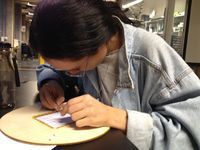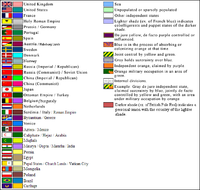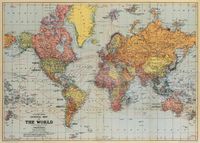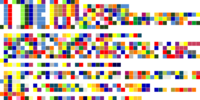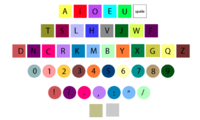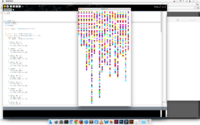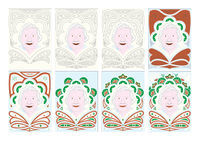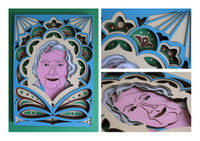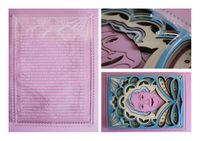Difference between revisions of "User:Brouki"
| Line 578: | Line 578: | ||
<br> | <br> | ||
| − | [[File:Tekening-02.jpg| | + | [[File:Tekening-02.jpg|350px]] |
<br> | <br> | ||
Revision as of 11:17, 8 November 2016
Contents
UNRAVEL THE MEME – the undervalued power of internet farts
First assignment
Meme: Nailed it
Partner: Meike Brand
The meme ‘Nailed it’ was the starting point of the Unravel the Meme assignment.
We started researching the history and analyzed it from different perspectives.
• Nailed It is a phrase used to express success after achieving something seemingly
difficult with relative ease. It is often found as a caption on image macros or in
sarcastic commentary criticizing the quality of success, especially in response to
attempts at recreating recipes or craft projects. Mimicry involves the practice
of “redoing” (the recreation of a specific text by other people and or by other means.)
Second assignment
We grouped up with two other teams. We started with the meme's; 'Tatta's be like', 'Bad luck Brian' and 'Praat Nederlands met me'. And based on our three different meme's we came up with the theme: TRANSLATION. Because you need to know the context of a meme to fully understand it. For example, you need to know the dutch language and the dutch culture to understand 'Tatta’s be like'. So you need to translate. We made 3 works about that.
I participated in the group: 'Rotterdamse Vertalert' together with Zina Burgers and Lisa Kuiken.
Our idea was to build a Rotterdam slang translator.
PROTOTYPE
- First draft of the website and scripting for the first time
RESULT
Rotterdamse Vertalert
We made the ‘Rotterdamse Vertalert’. Our main goal is to connect people through complaining in Rotterdam dialect and slang. Because Rotterdam people like to complain, we invite them with the question: ‘What to complain about today?’ If you type a Dutch complaint in our machine, you will get the translation in Rotterdam language.
Rotterdam people also like to share their complaints, so they can spread the word on social media. We invite them by the sentence: ‘Gedeelde leedt is halve leedt, pleurt je vertaalde zin er effies bij dan. Jatochniettan! Just like ‘Tatta’s be like’ this is only understandable for a small subculture. This exclusion makes the connection between the included ones stronger.
So: Effies een potje zeiken in het Rotterdams, dat bekt zo lekker.
Try it! Rotterdamse Vertalert
THE TWO OTHER GROUPS
Whatever be like
„Whatever be like“ deals with our situation of arriving in Rotterdam and getting to know the meme “Tattas be like” for the first time. Interesting about this meme is, that they are making fun of a culture and at the same time the phenomenon emerges from within the culture. Therefore this meme is an insider joke. We were thinking about the possibility to identify with cultural stereotypes and thought about typical situations from our own cultures. At the same time the question of how a meme appears, develops and is translated to different contexts is important. We would like to create an analogue platform for memes and invite the audience to draw, write or leave comments on sticky notes about something they find (stereo-)typical about themselves or their culture. Within the three days of the exhibition we would to see and show how the drawings and comments develop and if they are influenced by each other. Creating an analogue meme.
Spoken words
Transliteration. Translation. Copy. Paste. Visualisation. Transformation. Wille-Meike Brand, Laura Larissa Lang
Spoken words getting transformed by misunderstandings between analogue and digital language, by translation, reproduction and visualisation. The automated process relates to the development of memes and the way they transform within these progressions.
UNRAVELING THE "INFRA-ORDINARY" (of the 21st century)
~NOTES~
Dinsdag 22-09-'15 | 14:10 Coffee Company Eendrachtsplein Rotterdam
Person #1
scratch his nose, talking to his phone holding directly in front of his mouth/face, while listening to other person true his ear plugs, looks around, not talking so loud, looks like he's talking with somebody about or from work, has his laptop on his lap, scrolling around while he is talking, scratches his nose again, taking a sip of his coffee, sitting a bit uncomfortable, legs together to keep laptop straight, hunch a bit to the front, types with right hand while holding phone with his left hand, hardly moving his hand holding the phone, he's alone but not really alone, sometimes looks around and saw me looking at him, stretching his body now, looking more around him now, switches phone to other hand, and start scrolling with left hand on his laptop now, and scratches face again....
Person #2
reading a book, is alone, wearing glasses, no phone or laptop in sight, finished his coffee already, looks around sometimes, did not see me looking.
Person #3
sitting in front of me alone, still has his jacket on, phone in hand and typing, scrunch over, now puts phone down, puts elbows on table, hand on chin, and looks around, i think he is waiting for somebody, doesn't has his order yet, takes his phone again, swipes and types, looks outside again, and back to the phone, he hasn't looked at me yet, laugh out loud because of something on his phone, head down, phone a bit under the table, eyes down, no other movement what so ever, reading something on his phone..,
Person #4
sitting left of me, has a tablet on the table together with his phone, has a second phone in his bag, using the tablet now, has a little espresso next to him already finished, typing on his tablet, he is alone, he is chatting, scratching his head while reading, uses his right hand to swipe, left hand on head to support, elbows on table, also leaned a bit to the front over the tablet, puts hands down and start using both hands to type now...
Person #5
alone sitting in front of me but a few tables further away, drinking a large coffee, wearing her had and scarf, jacket hardly off shoulders, phone in right hand, phone almost in front of her face, head down to phone, eyes down, legs crossed, sometimes take a sip of drink and then puts phone down for a sec, then back in phone, no facial expressions, scratching her ear, neck, lips, keeps finger on lips, she gets a call, picks up, phone to her ear, now she is hanging over the table, more comfortable then when she was holding the phone before the call, both arms over, one holding the cup of drink, saw me looking, now she sits back on the couch again...
Person #6
two people sitting next to each other, a lady and a men, talking together about something they see on the laptop, talking louder then most people, drinking coffee, looks like friends or colleagues, not really looking at each other while talking, more looking around or revering to laptop...
INTERESTING POINTS
- Most people where alone but with their phone or laptop.
- A lot of people touches/scratches their faces while calling.
> People change their behavior when they see me looking.
People live inside a bubble, where they forget the people/world around them.
The moment they 'snap out of that' they feel watched and directly change their behavior.
Watched the movie HER
notes:
- All digital messages are hand written type
- The outfits are pretty old fashion and almost the same for everybody
- quote mentioned in the movie " mensen voelen zich pas vrij wanneer ze slapen"
[[1]]
fotoreportage van mensen in de trein.
FEEDBACK
Gabrielle:
Living in an Bubble and their behavior. You are not being critical about it (and that's no problem).
Think what more things people use to create a bubble, for example: books, newspaper. A subtle parting.
And now?
Go back to the same place and look closely. Not just at the people, but perhaps also at the building itself. Is it adjust to the digital era we live in now. And/or why do people come to work there?
Research
[[2]] Creating Good Places for Interaction
Funny fact: When i search for 'getting people to interact' in Google. All you find is things like '5 Charismatic Ways to Get Facebook Fans to Interact with You'.
CONCLUSION
PEOPLE COME TO THE COFFE COMPANY, A SOCIAL SETTING, TO SECLUDE THEM SELF AND WORK.
I WANT TO HELP PEOPLE GET MORE IN TOUCH WITH EACH OTHER, BY STIMULATING SOCIAL CONTACT.
IDEAS:
- Pull a number and get seated (not by choice)
- To create a coffee mog that brings people together.
- To design a power point/plug that needs two people to operate.
END RESULT
I decided to focus on the power-plug. Because, in a silent way, it forms the meeting point of the working people. But i want it to become non silent. A powerplug that needs an extra hand to open, something u can't do by yourself. This shouldn't be a problem because there are always enough people around you to help.
I crafted a box around the powerplug from wood as an prototype. It was an difficult task to come up with the right working design. Because normally everything is made to be as handy as possible. I had to do it the other way around. I came up with the idea of a box that has two sliding doors that you'll need to open with both hands and as soon as you let go it will snap back and closes the box again. This means you need to ask someone for help. One person needs to keep the box open while the other can plug in.
So get out of your bubble and start asking the person next to you for help. Perhaps you'll have a nice conversation or phone number as outcome ;)
NEXT STAP
- The box have to look more 'friendly'. Round shapes could be the answer.
- The prototype doesn't work u can still open it by your self.
- Is a box the right shape?
inspiration
CRAFTING MEMORY WORKSHOP
we (Kars, Sophie, Lisa, Nora) have eaten:
a bead (it was kars)
salad
bread with humus
a banana
bread with brie, ham and cheese
krentenbol
bread with salmon
sugar licorice
we crafted:
A critic on holy knowledge. It was supposed to be a circle but the universe wanted it to be a halo. Because that is what people understand. The knowledge is represented in the dataholding copper wire and mini beads. At least, we like to think it does, but it doesn't.
Because we were making 'the first born baby of data holding memory', or how others might call it 'the first computer', i also tried out this board design during the time left over ;)

CRAFTING FUTURE MEMORIES
FUTURE MEMORY ALPHABET
In collaboration with Kars van den Heuvel
Research and Process
We started with the idea to collect all kind of memories from people. We wanted to translate these memories in shape and intensify them by using the human senses. This and a couple of other similar ideas didn't really seemed to work out for us in the end. So we moved on.
After doing more research we found out that colours stimulate memory and creativity.
Research shows that:
- Color can increase brand recognition by 80%.
- In a clinical setting the use of color can help reduce in specific memory problems such as learning difficulties, autism, dyslexia.
- The use of color can reduce the reading difficulties of dyslexia.
- The reading rate of people with autism who used a colored overlay went up 35 % in advance.
- Colour is also used to treat patients suffering from Alzheimer's disease.
- Colors have the potential to attract our attention and raise attention levels, this way it helps us to remember things better.
The Right Colours Make Data Easier To Read:https://hbr.org/2014/04/the-right-colors-make-data-easier-to-read/
The next idea was to make an alphabet out of only colours. To make the right cross over from letter to colour we looked at how the computer reads text. By using the binaire code from a letter and translating this to a HEX code. This was possible but by each letter you could only get a third of the HEX, which means you would need three letters to get one colour. This was almost impossible to realize in processing.
Concept
After trying more options we managed to design an alphabet consisting out of colours. We used squares for the 26 letters of the alphabet and cirkels for the digits 0 till 9. We based our colours on an universal colour palet used for mapping countries. The colours are incompatible with the others, so that you can see the difference between countries. This is perfect for making an alphabet, because there must be a clear contrast and separation.
End Result
We wrote a program in processing. Where we could translate letters in to colours. After this we were able to translate any text we would like. As an example we translate the wiki page into an publication. You need time and diseplin to read the hole text and thats also a part of the statement we want to make. Photo's of the publication will follow.
Q10 UNRAVEL THE CODE
-Chosen Theme
Moment creëren waarbij mensen geprikkeld of bijna gedwongen worden contact te leggen met elkaar. In sociale openbare ruimtes waar mensen zich vooral afzonderen. bv Coffee Company
-Research Question (what question can you formulate to stimulate your research)
- Waar zal het object geplaatst worden? Op tafel, in de muur, aan het plafon, op de grond?
- Zal het een puur functioneel, confronterend of eerder speels object worden?
- Zal het terug reageren?
- Wordt het voor 2 of meer personen bedienbaar?
- Moet het meteen duidelijk zijn dat het een stopcontact is?
- groot en duidelijk of klein en verstopt?
- verschillende doelgroepen en dus verschillende object?
-Foreseen/possible result
stopcontact
-Defend the relevance (why is this urgent, why are YOU dealing with the theme, contemporary example from the professional field)
Door het digitale tijdperk leven mensen telkens meer in een bubble en wordt contact leggen met andere telkens moeilijker (vervreemd) voor de mens.
Graag wil ik het digitale (object) gebruiken als een schakelaar om mensen in contact te laten komen.
-Planning (what experiments will do carry out / how reasonable is your project in terms of time)
Concept
To force people to interact with each other,
before they enter their 'bubble' by plugin in their device.
How it works
Look and feel
Shapes?
I want it to be more:
Friendly, funny, colorful, playful
Proces
Finding the right kind of splitter
Almost all kind are impossible to open. So what ever design i would make, it haves to fit around the plastic shell. The new 'shell' shouldn't be any thicker then 1mm, otherwise the outlets don't fit in each other anymore.
Next to that it was pretty impossible finding a transversal outlet. Because the idea is to pile up many outlets. And if the outlets aren't transversal you can't use both holes.
This is the outlet i used. I found this one at 'De Schaap' an electric store on Kruiskade Rotterdam.
The way of staking the outlets reminded me again of the game Jenga. (lost picture on phone). The bigger the outlet pile the more it got unstable. Also the different kind of plug weight had effect on the balance.
Name and logo This is the outlet symbol that i found when searching for a name and logo for my 'product'. In this symbol i recognized the letters T and C. This made me come up with the name: "Top Contact".
I wasn't happy with this as end result. I think that the plastic could be more covered. Finding this out to late it wasn't possible to rent the phaser again. So i needed a plan B.
I decided to cover each block with thin wooden layers.
End result
It makes sure people connect for a few seconds before they plug in their device and (most certain) disconnect them self from the other people around them. But there will also arise a 'object' that makes people aware of the subject. The more people get plugged in the harder it will be to keep the outlets up straight. And even this moment forces people to work together and connect with each other.
MINOR RADIATION
ACOUSTIC RADIATION
https://koenvangeel.hotglue.me/?acoustic+radiation
ELECTROMAGNETIC RADIATION
http://digitalcraft.wdka.nl/wiki/User:Meikebrand/UTC/njm
LIGHT RADIATION
Research

First test: Camera obscura
De camera obscura in combinatie met licht gevoelig inkt dat gebruikt wordt op zeefdruk ramen.
Helaas kregen wij geen beeld vast gelegd. Dit kan komen doordat we de blikken niet lang genoeg
aan licht hebben blood gesteld of dat het niet werkt op het papier/stof dat we hebben gebruikt.
Hier zijn we niet verder mee gegaan, omdat we ondertussen ook bezig waren met ons
tweede experiment waar meer resultaat uit is gekomen.


Second test: Scanner
Making the invisible (message), visible again.

Third test: Photochromic ink
We kwamen erachter dat we op school licht gevoelig inkt hebt dat verkleurd door uv-licht.
Deze inkt word al veel gebruikt met zeefdruken wij begonnen ons af te vragen of dit ook
werkt gemengd met verschillend materiaal, waardoor het object volledig zal verkleuren.


Final idea
Vanuit alle testjes vonden het stukje latex het interessants. Het had een apart structuur
dat je doet denken aan een stuk huid en het maakte het extra gek wanneer het paars kleurde door uv.
Ook legde we verband met de eerste grot tekeningen die ook vaak op dierenhuid werd gemaakt en
het feit dat uv licht niet goed is voor de menselijke huid en teveel blootstelling huidkanker kan veroorzaken.
Zo kwamen we op het idee een grote (tekenvel) van latex te maken dat te berwerken valt met de 'hand'.
Een handschoen met uv licht waardoor je met paars kan tekenen op het doek.
 Uv-licht breek latex langzaam af. Dit is een oud voorbeeld in de keramiek werkplaats.
Uv-licht breek latex langzaam af. Dit is een oud voorbeeld in de keramiek werkplaats.
Wij vinden dit een mooi gegeven, dat net als de inkt ook het doek 'tijdelijk' is.
PATTERN RADIATION
RESEARCH

Het is niet bekend hoe de patronen ontstaan op het schild van een schildpad.
Er wordt beweerd dat dingen als warmte, kou, water, zwaartekracht etc hier wel invloed op hebben.
Idee #1 Kan ik iets laten groeien (zoals schimmel) en mijn eigen patronen kweken, door deze bijv op muziek (trillingen) te laten groeien?
Movement and patterns
Homopolaire motor: Een homopolaire motor is een elektromotor die wordt aangedreven door een magnetisch veld langs de draaias en een
elektrische stroom door een geleider die deels niet evenwijdig loopt aan het magnetisch veld. De lorentzkracht laat de geleider
en eventueel de magneet ronddraaien. Omdat de stroomrichting niet omkeert heet de motor homopolair.
Een homopolaire motor is omkeerbaar, net als de meeste elektromechanische machines: hij zet elektrische energie om in beweging,
maar kan ook beweging omzetten in elektrische energie, als een dynamo - homopolaire generator.
De homopolaire motor was het allereerste apparaat dat elektromagnetisme omzette in draaiing. Hij werd gebouwd en gedemonstreerd
door Michael Faraday in 1821 in de Royal Institution te Londen.
WERKPROCES
Pe Lang http://pelang.ch/works.html























